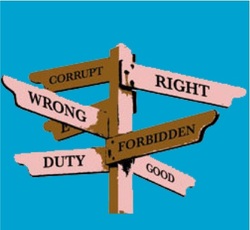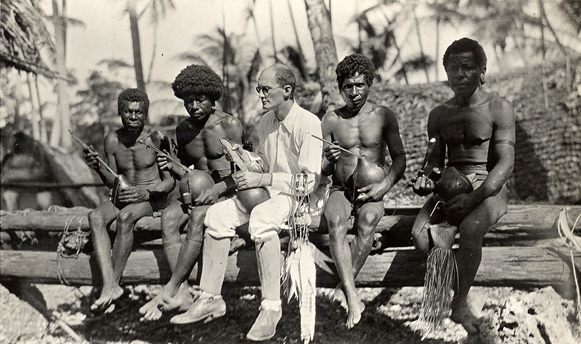 Genealogy of Morality and Moral Codes (Homayoun Shahri, PhD, MA, LMFT) Morality is defined as a set of principles and system of values concerning what is “right” and what is “wrong”. We can all appreciate that morality changes from society to society, historical era to historical era, etc. Thus we have morality of the 19th century vs that of the 20th century, and we have the Christian morality vs Islamic morality, and for example morality in Saudi Arabia vs morality in Sweden. They are all different. Thus to take morality as the way it relates to existing code of conduct, may negate the existence of a universal code of conduct and morality. The 18th century German philosopher Emmanuel Kant attempted to answer the question of universal morality by describing what he called “categorical imperatives” which were a set of principles and values that Kant believed were universally applicable as moral codes of conduct. However, since text can only refer to text (in postmodern deconstructionist thinking of Derrida), Kant's categorical imperatives cannot refer to anything absolute and immutable as he and modern thinkers believed, as text is subject to interpretation. Aside from Kantian ethics and morality specified in categorical imperatives, moral codes were designed to insure and preserve the current socioeconomic system both at a micro level (within the family and the individual) as well as a macro level (within the society). Thus the moral codes are designed to reproduce the current and dominant relational transactions within the socioeconomic system and preserve the power hierarchies. The individual members of the society are then relegated to a position in which there is no need to take responsibility for their own behaviors and actions, as long as the moral codes (some of which are enforced by laws) are followed. This is Nietzsche's point in the statement: “Morality is herd-instinct in individual”. He divided the society into the supermen (Ubermensch) and the “herd” who follow them. The supermen have transcended good and evil, and are beyond moral codes. They define the moral codes based on their own belief system and to keep the herd in check to reduce their anxieties (related to taking responsibility for their lives). And for the “herd”, as the moral codes weaken, chaos (within behavior) ensues, as evident in this era of human existence. Wilhelm Reich introduced the term “Natural Morality”. He believed that human organism, if not split from its unitary function (mind-body, thinking-feeling, etc), is self regulating. Natural morality will then be the set of all actions and system of values that support self regulatory function of the human organism. These natural codes increase aliveness and motility, promote life in general (of all sentient beings on the planet), increase pleasure and reduce pain, etc. Reich believed that a successful therapy should end when the patient has achieved self regulation and can decide for himself what is right and what is wrong without needing the herd based moral codes of the society. Natural morality may also be deconstructed were it not for its connection to the bodily feelings, which are not text and do not refer to text, and thus are not subject to interpretation. Feelings defy definition but we all have a felt sense of what they are. If one reads the works of famous anthropologists like Margaret Mead or Branislaw Malinowski, which indicate that violence and destructiveness may not be innate in human animal but may be related to patriarchal that authoritarian upbringing, in which all natural and healthy instinct of the child is repressed. Violence simply did not exist (in the same way as today) in matriarchal societies. There was thus no need for introduction of moral codes. Perhaps we should strive toward building a modern version of matriarchal societies which will necessarily be egalitarian, and power hierarchies will not exist. Authority will be based on knowledge and not power. Wealth will be based on one's happiness and ability to enjoy life and not monetary wealth. Am I a Utopian? I don't believe so. This, in primitive form, did exist once during the brief presence of our species on the planet, that gives me hope ... But in the mean time the question is what is to be done, so that we can enjoy our lives but also strive in this direction. This comes from my humanism and love of humanity despite its flaws and destructive behavior. Perhaps all that can be done is to pass the word along, hoping that more and more people can hear. The only hope may be with children, as most of our adults are beyond help and their "core" cannot be reached. In other words they are far gone. But perhaps a generation of healthy children can reverse the destructive trend. Although, looking at today's children, I am not hopeful at all, as their aliveness is even less that our generation!!! This is one of the reasons why I left the field of engineering and entered the field of psychotherapy, despite major financial impact. PATRIARCHY VS MATRIARCHY (Homayoun Shahri, Ph.D., M.A., LMFT)
Patriarchy and matriarchy are defined in terms line of inheritance. In patriarchy inheritance is transmitted from father to off springs, but in matriarchy inheritance is transmitted through blood relationships. Thus in a matriarchal system off springs inherit from their maternal uncle and not from their father. Branislaw Malinowski, a prominent anthropologist, lived among and studied natives of Trobriand Islands (near the eastern coast of New Guinea), a matriarchal society on the verge of transformation to patriarchy, during the first decade of the 20th century. His observations were astonishing. He observed a very peaceful, loving, and friendly people. Children's sexuality was not repressed by parents or the society, and they engaged in sexual activities from a young age, and to the surprise of Malinowski very few native girls got pregnant before the start of eloping with a man. By the age of 20 to 25 the native men and women usually would settle with one partner and the woman would move to the man's house, and their elopement started. They would live together as long as there was love between them. Men usually collected fruites, roots, and planted various crops such as yams and taro roots, women took care of children and household matters. Part of man's annual collection of roots and fish, etc would go to his sister (his blood relative). If the couple fell out of love neither would suffer any economic consequences, as the woman was supported by her brother, and man could support himself. They would just separate and find anther suitable partner. Children would stay with their mother, as the role of father was not known to the natives. There was not economic advantage to remain eloped. Margaret Mead in her book, "Sex and Temperament in Three Primitive Societies", gave similar accounts to those that Malinowski described in his field work and studies of the natives of Trobriand Islands. Malinowski observed that Oedipus complex did not exist in this society (experience during Oedipal period did not result in Oedipus complex) and hypothesized that perhaps Freud's assertion regarding Oedipus complex might not have been as ubiquitous and universal as he claimed. This indicated to Malinowski, and later confirmed by Wilhelm Reich that it is the sexual repression of children, and the charged sexual environment within the patriarchal family that may result in the Oedipus complex, as Freud conceived of and discussed in his writings. Accumulation of wealth was not possible in this society as the food that they produced was very perishable and had to be consumed quickly, same for game and fish that they hunted and caught. This society was essentially a hunter-gatherer society. This society was very egalitarian and there were no hierarchies present in the society had it not been for the existence of the chief. Fathers generally were very friendly to their children and sons, but the role of maternal uncle was more of a what we know as a father in our society. Stealing, violence, sexual assault, and other antisocial behavior were non-existent in this society. Trobriand Islanders had a chief. Chief would collect a small portion of all production and keep it for emergencies. What he collected would be consumed in a ceremony and feast, in case no emergency condition arose. That made the chief somewhat richer than the rest of the society. The chieftain realized that if his son eloped (married) their sister's daughter then wealth would remain withing chief's family, due to the nature of inheritance. Thus the chief kept his son abstinent and his sister kept her daughter abstinent. Malinowski recorded that all the antisocial behavior was limited to this group! The transition to patriarchy began when man started cultivating crops such as wheat which could be stored and kept for a relatively long time. Thus the man who cultivated more wheat and similar crops became richer. In order for him to keep his wealth in his family he probably used a similar strategy as the Trobriand chieftain, thus keeping his sons and daughters abstinent. As the number of these rich farmers grew their sons had to marry daughters of other rich farmers. This is how the concept of dowry started. Thus now there was a price placed on the woman (in the form of dowry) so that only another rich farmer's son could marry the woman of status, and not an average member of the society, hence started the objectification of women. Of course the girl had to be kept abstinent as well so that wealth does not dissipate among commoners. Of course keeping boys and girls abstinent required authority, and discipline. This was the genesis of patriarchy, and authoritarian system of governance, the formation of marriage and later the state. Friedrich Engles in his book, “Origins of private property, family, and state”, also confirms what Malinowski had observed, albeit with some minor differences. Wilhelm Reich, an associate of Freud, who was influenced by Malinowski formed Sexual-Political Organizations which he called “SexPols” right around the rise of Nazi's in Germany. He would educate teenagers about sexuality (what is done in High Schools today), and would provide contraceptives to them. At its peak, SexPols had over 40 thousand members across Germany. He documented that not even one SexPol member gravitated to Nazi ideology. From his experiments, documented in his books (SexPols, and Mass Psychology of Fascism, among others), he postulated that fascist and authoritarian regimes appeal to the most repressive and anti-sexual aspects of the patriarchal family (apparent in Nazi slogans). Is it then surprising that most religions as well as authoritarian systems have an anti-sexual nature, and promote marriage (in traditional loveless sense), are against choice for women, and support objectification and subjugation of women? Where do we go from here? Reich in his book, Sexual Revolution, analyzed some reforms that were implemented early in the former Soviet Union (around 1920s which were all retracted when Stalin rose to power). These included abolition of marriage, declaring that children are property of state, meaning that their well being is guaranteed by the state. Women are also property of state (as men always were), and thus cannot be exchanged with and for money (dowry), nor can then abused. These reforms, according to Reich were very successful. I believe we can learn from these experiments, and implement them in our society, if are to live in a peaceful society which is connected with nature, does not destroy mother earth for profit, does not repress its children (sexually and otherwise), does not wage wars, nor does it exploit its fellow human beings for economic gain, but provides the conditions for a life of pleasure and joy, love and tranquility. References: Branislaw Malinowski – Sexual life of savages. Branislaw Malinowski – Argonauts of Western Pacific. Friedrich Engles – Origin of Family, Private Property and State. Wilhelm Reich – SexPols. Wilhelm Reich – Mass Psychology of Fascism. Wilhelm Reich – Sexual Revolution. Wilhelm Reich – Invasion of Compulsory Sex Morality. Branislaw Malinowski among natives of Trobrian Islands |
AuthorHomayoun Shahri Archives
May 2016
Categories
All
|
Ravonkavi Privacy Policy
©2018 Ravonkavi
©2018 Ravonkavi


 RSS Feed
RSS Feed